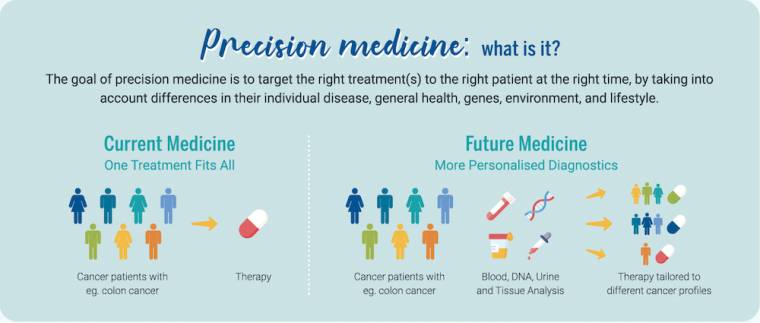Precision Medicine: How It’s Leading the Way in Cancer Treatment

Precision medicine is paving the way to the future of cancer care, with more personalised and targeted approaches to treatment. Dr Richard Quek, Senior Consultant, Medical Oncology shares more about what it is, and what it means for patients.
New frontiers in medicine are moving beyond the ‘what’ and ‘why’ of the disease. Increasingly over the last decade, it has become about how diseases can affect different individuals in different ways. A nuanced understanding of individual disease profiles can open doors to more personalised treatment approaches in cancer care. This is where precision medicine comes in.
Precision medicine: what is it?
Conventionally, most medical treatments are designed as a ‘one-size-fits-all’ approach, tailored to the average patient.
This is changing with the emergence of precision medicine. Also known as ‘personalised medicine’, precision medicine tailors treatment to each individual patient by taking into account the complex differences in their individual disease, general health, genes, environment, and lifestyle.
This approach has led to a transformation in the way we treat cancer and other diseases, as it allows us to target the right treatment(s) to the right patient at the right time, to improve the patient’s chances of survival and reduce exposure to adverse effects.

How precision medicine works
Patients with certain subclasses of cancers have genetic profiles that are different from those in other patients, even if they have the same type of cancer.
For example, not every breast cancer has the exact same gene mutations, so these cancers may not always respond to the same treatment in the same way.
Recognising such variations in the disease has been critical in helping doctors match the best possible treatments to the right patients. Advances in imaging, staging, cancer mutation profiling and genetic testing have helped doctors identify cancer subtypes more accurately. With this information, doctors can determine the most appropriate, effective and least invasive treatment for the patient’s specific cancer profile, to maximise patient outcomes.
Besides helping doctors choose the best treatment options for a patient’s individual disease, precision medicine may also help doctors to:
- Identify individuals who may be at high risk for cancer, and help them lower their risk
- Find certain cancers early
- Diagnose specific subtypes of cancer
- Evaluate the responsiveness of a particular treatment
Precision medicine in action
Over the last decade, advances in precision medicine have led to new treatment discoveries that are tailored to specific characteristics of individuals, such as a person's genetic makeup, or the genetic profile of an individual's tumor.
Two types of treatment that have emerged in recent years include targeted therapy and immunotherapy. Targeted therapy are drugs designed to target specific mutations on cancer cells, while immunotherapy drugs are used to harness the patient’s own immune system to control the cancer.
These treatments are currently being used to manage common cancers such as lung, breast, colorectal, stomach, liver, melanoma, certain types of leukemia and lymphoma, and many others.
For example, patients with HER2 (human epidermal growth factor receptor 2) positive breast cancer can be treated by blocking the targets that stimulate the growth of cancer cells, to control tumour growth effectively with minimal side effects to normal cells.
In the case of patients with advanced lung cancer, targeted therapy and immunotherapy have brought about significant improvements to survival rates. About half of patients survive at the 3- to 4-year mark when treated with targeted therapy, while 30–40% of patients have good disease control at the 5-year mark when treated with immunotherapy.
What it means for patients
The era of precision medicine has changed the way we perceive cancer and cancer treatment. Previously, cancer was commonly associated with poor quality of life. Today, the focus has shifted to achieving good disease control and offering patients a positive survival outlook and good quality of life.
Precision medicine provides clear advantages for patients and caregivers through earlier diagnosis, avoidance of unnecessary treatments, improvements in treatment response and better outcomes. From immunotherapy to targeted therapy, precision medicine offers patients more personalised treatment with greater effectiveness.
Precision Medicine: How It’s Leading the Way in Cancer Treatment originally appeared on Parkway Cancer Centre
and has been republished with permission
Further Reading
The article above is meant to provide general information and does not replace a doctor's consultation.
Please see your doctor for professional advice.
